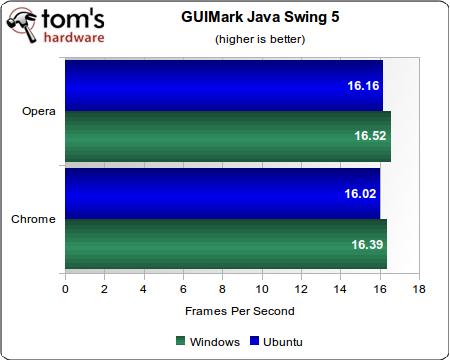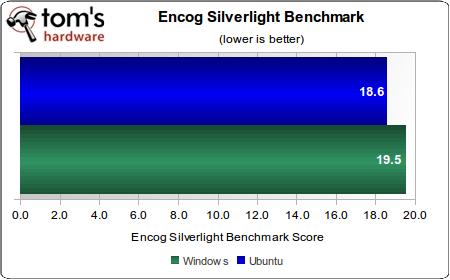Web Browser Grand Prix 2: Running The Linux Circuit
Last week we showed Opera 10.60 to be the world's fastest Web browser. That was in the Windows world. But where do Chrome, Firefox, and Opera stand in Linux? Today we find out. Adding the Win 7 results, we'll also learn which OS has the speediest browser.
Benchmark Results: Java And Moonlight
GUIMark Java
Firefox wouldn't run the GUIMark Java 5 Swing test. It appeared to begin loading the test, but after more than 20 minutes, no progress was made.
Opera beats Google Chrome in this benchmark, though by a very minor fraction of a frame. Both browsers perform well in this test and the placing remains the same from our Windows 7 results, with the Ubuntu scores just slightly lower.
Encog Silverlight Benchmark
Since there is no Microsoft Silverlight for Linux, we are actually testing the performance of Novell's Moonlight, an open source project that makes use of Silverlight on Unix-like systems. Unfortunately, a cross-browser comparison isn't possible because Mozilla Firefox is the only Web browser to have a Moonlight plug-in.
The current version of Moonlight is actually a few versions of Silverlight behind as well. What the following chart shows is the latest version of Microsoft Silverlight running on Windows 7 versus the the open source implementation of an older version of Silverlight running on Ubuntu 10.04. While that introduces a number of variables, this is also the only way it works right now. The Firefox result on Ubuntu reflects the most up-to-date performance for Silverlight applications running on Linux. We include this benchmark not so much as a performance measurement, but as a litmus test of where we are on the Silverlight front in Linux today. This result obviously will not count in Mozilla's favor in our final results.
In the Encog Silverlight Benchmark, lower is better, and Firefox with Moonlight on Ubuntu earns nearly a full point less than Firefox with Silverlight on Windows.
Get Tom's Hardware's best news and in-depth reviews, straight to your inbox.
All of the browsers running in Windows 7 are within less than a half point from each other. Until I can find a real-world killer app for Silverlight 2.x (that works on Linux) to actually demonstrate an improvement, there are just too many factors going on here to include this result in the Windows versus Linux side of the conclusion.
Current page: Benchmark Results: Java And Moonlight
Prev Page Benchmark Results: Flash Next Page Benchmark Results: Memory Usage-
Tamz_msc The article that I was waiting for.How the tables have turned!Reply
Conclusion:Firefox is quite capable in both Linux and Windows.
I'm using Firefox 4 beta and I find it pretty quick. -
micr0be yes i would have loved to have seen the firefox 4 beta with the results. although great article.Reply -
adamovera weirdguy99Why not put firefox 4 into the equation?micr0beyes i would have loved to have seen the firefox 4 beta with the results. although great article.When it's final, I'll test it.Reply -
Tamz_msc DamdamanI'll get berated for this I'm sure but will we see an OSX article on browsers as well?You are kidding,right?Reply -
arnweb Opera Turbo feature, is not mentioned here, it can boost speed in real surf. And also when we open a closed tab in Opera it opens them instantly, that's why Opera holds memory for closed, tab.Reply -
Sihastru Opera still can't render pages properly, still can't print content properly, and we waste our time with senseless tests of imperceptible speed.Reply -
The_King I dont think anyone using firefox will change to another browser even if it is Faster. I love my firefox :)Reply -
Tamz_msc arnwebOpera Turbo feature, is not mentioned here, it can boost speed in real surf. And also when we open a closed tab in Opera it opens them instantly, that's why Opera holds memory for closed, tab.Opera Turbo increases page load times on slow connections.On my 2Mbps connection the time in which Opera Turbo connects to its servers is the time in which Google loads in Firefox.Reply

